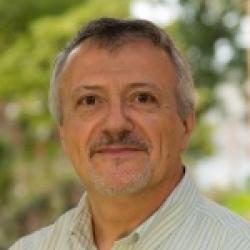Program overview
The Agronomy concentration within the Integrative Plant Science MPS focuses on soil and nutrient management, crop physiology and ecology, cropping systems, and pest management with an emphasis on solving practical problems.
Agronomy is the interdisciplinary science and applied practice of sustainable field crop production, including organic farming. By nature, agronomy recognizes that productivity, farm profitability, and the essential ecosystem services derived from agriculture require the integrated management of soils, crops, and other part of the farm enterprise – often including animals.
Good agronomy necessitates systems thinking that combines foundational biophysical concepts with economics, risk management, and the challenges of scaling novel production technologies. With rapid advances in digital agriculture open new pathways for precision management coupled with the growing urgency of maintaining crop productivity while protecting natural resources, the demand for highly skilled agronomists has never been higher.
CALS MPS program details
Cornell’s College of Agriculture and Life Sciences (CALS) Master of Professional Studies (MPS) program is an accredited, course-based, one-year master’s degree program that emphasizes professional development and intellectual investigation in the areas of agriculture, life sciences and global development. (The Integrative Plant Science MPS program is STEM-designated degree program.)
Though similar to a Master of Science (M.S.) degree in its academic rigor, the MPS degree differs from a traditional M.S. degree in its structure and focus. An M.S. is research-based, with students building a thesis over the course of two or three years. In contrast, the MPS degree is a one-year, course-based program where students study the intricacies and in-depth questions of their field of study. Instead of a thesis or research project, MPS students complete a capstone project during their final semester. To understand this difference in greater detail, please visit our FAQ page.
MPS students are part of a community of diverse students and faculty who share common goals, connecting research and practice to solve complex problems.
The Integrative Plant Science Master of Professional Studies program is a STEM-designated degree with coursework requirements that differ slightly from other MPS programs at Cornell.
Field of Integrative Plant Science MPS Degree Requirements:
Students earning the MPS in Integrative Plant Science complete 30 credits of graduate level courses (5000+), with at least 20 of these credits earned through the College of Agriculture & Life Sciences, and at least 18 of these credits taken for letter grade. (Note that physical education courses and language courses do not count towards degree.)
Specific course requirements of the Integrative Plant Science MPS Degree are as follows:
- Core Courses (13 credits required):
- Professional Development (5 – 9 credits)
- Quantitative Literacy (2 – 6 credits)
- Capstone Project (2 – 6 credits)
- Concentration Courses (12 credits required):
- Courses specific to your concentration
- Elective Courses (5 credits required)
This project may be an action program, the development of a plan to address a pertinent problem, the development of materials or methodology suited to the student's situation, or the development and execution of research appropriate to the profession. A formal project report must be submitted to and approved by the candidate's faculty advisor.
Next steps
Deadline to apply: February 15*
- Request more information
- How to apply
- Apply now
- calsprofprograms [at] cornell.edu (subject: More%20information%20about%20MPS%20CEA%20admissions) (Email us with questions)
*For regular Fall Semester start. Late applications may be accepted under exceptional circumstances. Contact Tara Reed for more information: tln2 [at] cornell.edu (tln2[at]cornell[dot]edu).

Meet some of our Agronomy faculty
Faculty spotlight
Toni DiTommaso
Toni is the chair of the Soil and Crop Sciences Section and studies the basic biological/ecological principles governing agricultural and environmental weed population dynamics. He investigates the development and implementation of safe, effective, sustainable and economically viable weed management strategies, and coaches Cornell's student weed science team.


E.V. Baker Professor of Agriculture
School of Integrative Plant Science
Soil and Crop Sciences Section
- (607) 255-0945
- jhc5 [at] cornell.edu

Professor and Section Head
School of Integrative Plant Science
Soil and Crop Sciences Section
- (607) 254-4702
- ad97 [at] cornell.edu
- (607) 255-1904
- ph14 [at] cornell.edu
- (607) 255-2212
- vk364 [at] cornell.edu

Assistant Professor
School of Integrative Plant Science
Soil and Crop Sciences Section
- ll928 [at] cornell.edu

Associate Professor
School of Integrative Plant Science
Soil and Crop Sciences Section
Associate Professor
Department of Global Development
- ajm9 [at] cornell.edu
- (607) 255-7122
- gmp32 [at] cornell.edu
- (607) 220-6139
- jap255 [at] cornell.edu

Professor and Director of Undergraduate Studies, Plant Sciences Major
School of Integrative Plant Science
Horticulture Section
Professor
Department of Global Development
- (607) 255-1778
- mpp3 [at] cornell.edu
- (315) 787-2311
- sr43 [at] cornell.edu
- (607) 255-4964
- mrr232 [at] cornell.edu

Senior Research Associate
School of Integrative Plant Science
Soil and Crop Sciences Section
- (607) 255-1448
- pbw1 [at] cornell.edu
More information
Application fee waivers - International applicants, as well as U.S. applicants, may be eligible for an application fee waiver for financial hardship and other reasons. More information.
Questions about Integrative Plant Science MPS? Contact us:
Dan Buckley
Director of Graduate Studies
Graduate Field of Integrative Plant Science (IPS)
Phone: (607) 255-1716
Email: dhb28 [at] cornell.edu (dhb28[at]cornell[dot]edu)
Tara Reed
Program Coordinator
Graduate Field of Integrative Plant Science (IPS)
Phone: (607) 255-2131
Email: tln2 [at] cornell.edu (tln2[at]cornell[dot]edu)
Marvin Pritts
Student Experience Coordinator
Graduate Field of Integrative Plant Science (IPS)
Phone: (607) 255-1778
Email: mpp3 [at] cornell.edu (mpp3[at]cornell[dot]edu)











